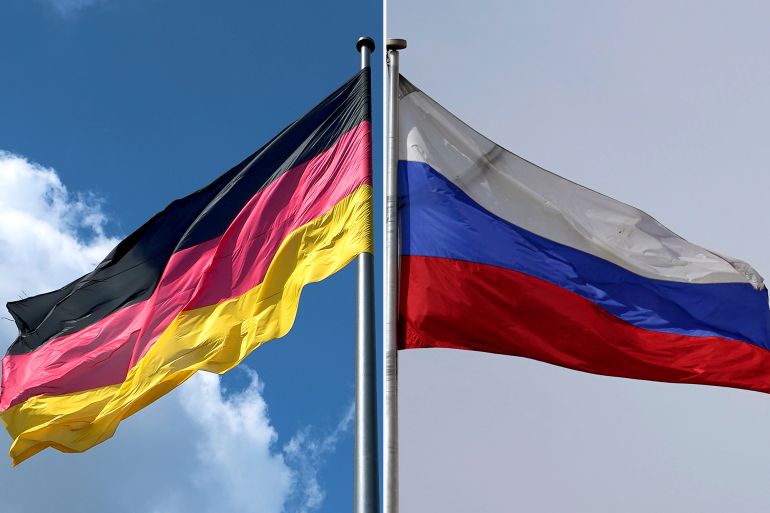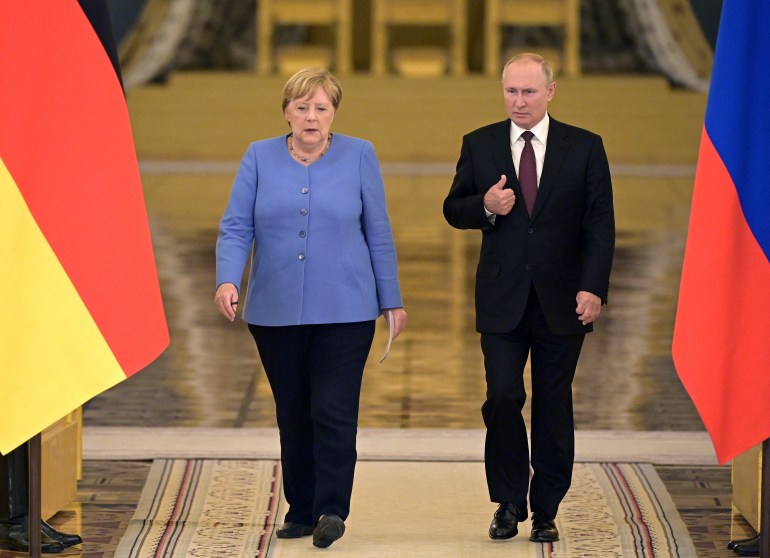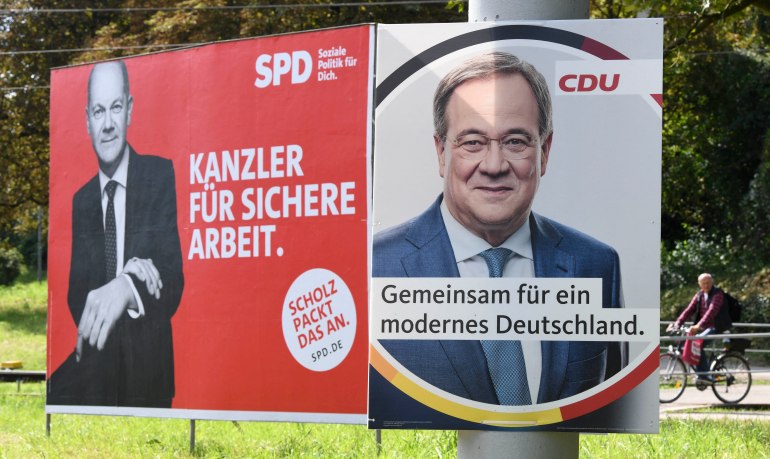German election: What’s next for the Russia-Germany relationship?
As Angela Merkel prepares for her retirement, her successor will take over at a time when Russian-German relations are at their lowest ebb in years.

Berlin, Germany – Both are of a similar age, fluent speakers of each other’s native language, former residents of Dresden in communist East Germany, and defining political figures of their era.
Shared experiences have underpinned the relationship between German Chancellor Angela Merkel and Russian President Vladimir Putin, which has been at times courteous – with the pair exchanging gifts of beer and smoked fish – and at others deeply recriminatory.
Keep reading
list of 3 itemsMerkel and Putin clash over Navalny during talks in Moscow
Biden, Merkel united against Russia, disagreements remain
Merkel’s 20 visits to Moscow throughout her tenure have made her the primary representative of Europe and the West in the halls of the Kremlin.
Now, as Merkel prepares for her retirement from politics following Germany’s federal elections, her successor will take over at a time when Russian-German relations are at their lowest ebb in years.
Russia’s involvement in the war in Ukraine, its continuing repression of political opponents, and perceived attempts to undermine democracy in Germany have led to a breakdown in dialogue and increasing doubt in Berlin that a cooperative approach towards Russia can be maintained, analysts told Al Jazeera.
“It’s the question: What is the future of EU and German Russian relations with a more aggressive regime externally, and repressive internally?“, said Stefan Meister, an expert on Russia with the German Council on Foreign Relations.
“I think there will be further alienation.”
Russia’s annexation of Crimea and its covert use of military forces in Ukraine in 2014 shattered the diplomatic status quo with Germany, which has since taken a leading role in imposing EU sanctions and supported Ukraine with more than one billion euros ($1.18bn) in financial aid.
Mutual trust declined further after a 2015 cyberattack on Germany’s parliament, which the federal prosecutor sourced to an operative of the GRU, Russia’s foreign intelligence agency.
Merkel denounced the hack, which included the theft 16 gigabytes of sensitive emails and data, as an example of “hybrid warfare” conducted by Moscow.
Germany nonetheless retains strong economic links with Russia, its second-largest trading partner and a critical supplier of natural gas.
“The base of relations between Germany and Russia is more economic than political,” Alexander Baunov, a senior fellow at the Carnegie Moscow Centre, told Al Jazeera.
“It’s more about trade and deals and technologies and investment than about who is more important in the world.”

Replacements for Merkel
The two favourites to succeed Merkel as chancellor – the Social Democratic Party’s (SDP) Olaf Scholz and Christian Democrats leader Armin Laschet – are both parts of the current governing coalition, and have signalled that they will not veer far from Merkel’s approach of separating diplomatic criticism from economic cooperation.
Neither Laschet, currently leader of Germany’s largest state, North Rhine-Westphalia, nor Scholz, the country’s finance minister, have significant experience dealing in foreign affairs, or with Russia in particular.
Scholz, whose SDP is currently leading in polls, has criticised Russia’s violation of “inviolable borders” in Ukraine and its attempt to destabilise European politics, while also proposing a renewed European “Ostpolitik”, a nod to the policy of rapprochement of his predecessor Willy Brandt towards the USSR.
“If things are to change, there must be bridges and channels for dialogue in order to return to a better relationship,” he said in a foreign policy discussion in June.
Laschet has also criticised Russia’s interference within other countries and the Kremlin’s repression of critics at home. He has called for more dialogue and the development of a united approach from EU member states.
“We have sanctions, but breaking off diplomatic relations or anything like that would be wrong,” he told broadcaster Deutsche Welle earlier this year.
Both leaders support the Nord Stream 2 pipeline, which upon completion will deliver 55 billion cubic metres (1.9 trillion cubic feet) of natural gas per year directly from Russia to Germany.
The Green Party, which is polling third and could be a coalition partner in the next government, is significantly more hawkish on Russia, and could influence policy if they are given the foreign ministry. The party has said its candidate, Annalena Baerbock, has been targeted by a Kremlin-backed campaign of abuse on social media, including doctored images and conspiracy theories, for opposing the pipeline.
“When it comes to Laschet and Scholz, more or less continuity is to be expected,” said Liana Fix, international affairs director at the Koerber Foundation.
“The only question that remains is how strong will the value basis be. So to what extent would they place focus on human rights and domestic developments in Russia [or rather] on economic interests?“

Divisions over the pipeline
The last section of the almost 2,500-kilometre (1,553-mile) Nord Stream 2 pipeline was welded on Monday, and Russian state-backed energy conglomerate Gazprom, its sole shareholder, expects it to begin pumping gas beneath the Baltic sea later this year.
Germany has supported the completion of the $11bn mega-project despite threats by the US to sanction involved companies and Ukraine’s concerns that it will be left vulnerable when its current gas transit agreement with Russia expires in 2024.
Proponents, including Germany’s industrial sector, have argued the pipeline is necessary for German energy security and its planned phase out of coal.
But putting its economic interests first has undermined trust in Germany in the eyes of Poland, the Baltic states and Ukraine, said Fix.
“It was unclear how a tough stance on sanctions towards Russia on Ukraine came together with Nord Stream 2,” she said.
During her last trip to Kyiv in August, Merkel attempted to allay fears that the pipeline would be used for political leverage by warning of retaliatory sanctions. However, Ukrainian President Volodymyr Zelenskyy remained unpersuaded.
“I believe that not to notice that this is a dangerous weapon, not only for Ukraine but for the whole of Europe, is wrong,” he told a joint news conference.
Divisions within Europe over the pipeline will not disappear, and may be capitalised upon by Putin, Meister told Al Jazeera.
“This will always create a vulnerability or weak spot for Germany, getting criticised by Washington and getting criticised also by many, many member states of the EU,” he added.
Jailed Kremlin critic
The poisoning of Russian opposition figure Alexei Navalny last year cast a further pall over relations between the two countries.
After becoming severely ill on a flight, Navalny was flown to Berlin for treatment at Charite hospital, where German investigators confirmed the presence of Novichok, a rare nerve agent developed in the Soviet Union. German officials suggested its use pointed towards the involvement of Russian state actors. Russia has denied any involvement and said it has seen no evidence he was poisoned.
The German government has continued to advocate for Navalny, who was sentenced to two and a half years in prison after returning to Russia, on what human rights groups have said are politically motivated charges of fraud.
Merkel raised his plight with Putin at their farewell meeting in August.
“I have demanded once again from the president to release Navalny and I have made it clear that we will remain on the case,” she said.
Putin dismissed her concerns bluntly, countering that there was nothing political about Navalny’s sentencing.
This increasing gulf between the two longstanding counterparts does not augur well for Merkel’s successor, who will lack the stature and respect she built over the years, said Meister.
“There isn’t, at the moment, much room for dialogue. Now, there are very few topics left over where Russia has an interest to talk with Germany, Europe or the West at all.”